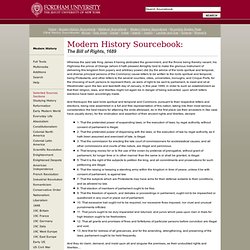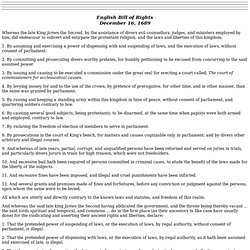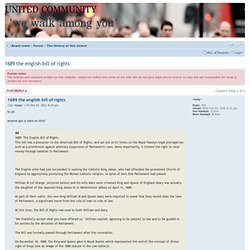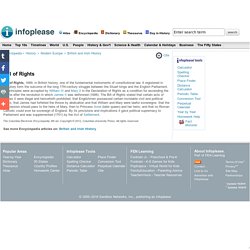

English Bill of Rights 1689. Internet History Sourcebooks. Modern History Sourcebook: The Bill of Rights, 1689 Whereas the said late King James II having abdicated the government, and the throne being thereby vacant, his Highness the prince of Orange (whom it hath pleased Almighty God to make the glorious instrument of delivering this kingdom from popery and arbitrary power) did (by the advice of the lords spiritual and temporal, and diverse principal persons of the Commons) cause letters to be written to the lords spiritual and temporal, being Protestants, and other letters to the several counties, cities, universities, boroughs, and Cinque Ports, for the choosing of such persons to represent them, as were of right to be sent to parliament, to meet and sit at Westminster upon the two and twentieth day of January, in this year 1689, in order to such an establishment as that their religion, laws, and liberties might not again be in danger of being subverted; upon which letters elections have been accordingly made.

English Bill of Rights. English Bill of Rights December 16, 1689 Whereas the late King James the Second, by the assistance of divers evil counsellors, judges, and ministers employed by him, did endeavour to subvert and extirpate the protestant religion, and the laws and liberties of this kingdom.

View topic - 1689 the english bill of rights. 1689: The English Bill of RightsThis bill was a precursor to the American Bill of Rights, and set out strict limits on the Royal Family's legal prerogatives such as a prohibition against arbitrary suspension of Parliament's laws.

More importantly, it limited the right to raise money through taxation to Parliament. The English elite had just succeeded in ousting the Catholic King James, who had offended the protestant Church of England by aggressively promoting the Roman Catholic religion, in spite of laws that Parliament had passed. William III (of Orange, pictured below) and his wife Mary were crowned King and Queen of England (Mary was actually the daughter of the deposed King James II) in Westminster Abbey on April 11, 1689. Bill of Rights 1689. Bill of Rights, in British history. Bill of Rights, 1689, in British history, one of the fundamental instruments of constitutional law.

It registered in statutory form the outcome of the long 17th-century struggle between the Stuart kings and the English Parliament. Its principles were accepted by William III and Mary II in the Declaration of Rights as a condition for ascending the throne after the revolution in which James II was dethroned (1688). The Bill of Rights stated that certain acts of James II were illegal and henceforth prohibited; that Englishmen possessed certain inviolable civil and political rights; that James had forfeited the throne by abdication and that William and Mary were lawful sovereigns; that the succession should pass to the heirs of Mary, then to Princess Anne (later queen) and her heirs; and that no Roman Catholic could ever be sovereign of England. By its provisions and implications it gave political supremacy to Parliament and was supplemented (1701) by the Act of Settlement.